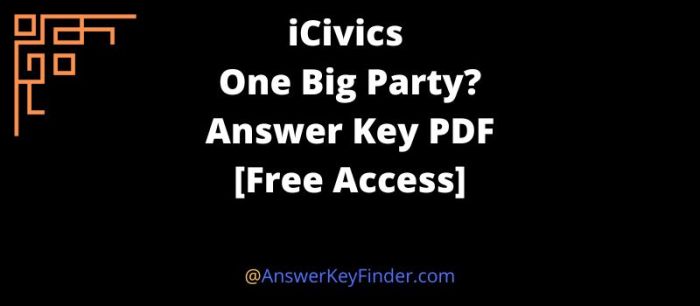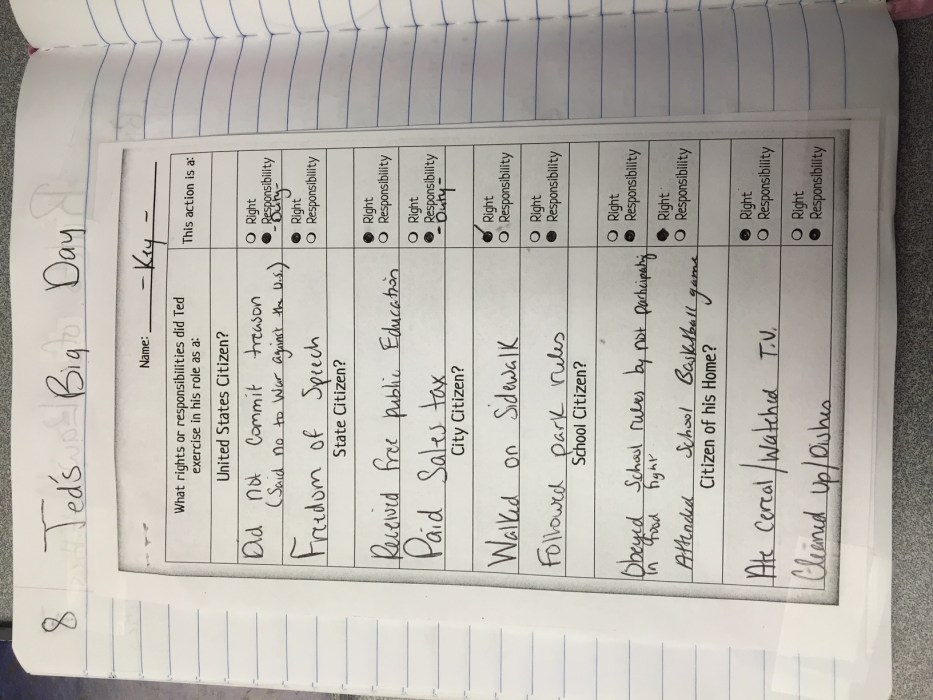One big party icivics answer key – Embark on an intellectual odyssey with our comprehensive analysis of One Big Party I Civics Answer Key. This in-depth exploration delves into the complexities of single-party systems, shedding light on their historical origins, defining characteristics, and global impact.
Our meticulously crafted guide provides a panoramic view of One Big Party systems, examining their potential benefits and drawbacks. Real-world examples and case studies illuminate the practical implications of these political structures, offering a nuanced understanding of their impact on society.
1. Introduction to One Big Party

One Big Party (OBP) systems refer to political systems characterized by the dominance of a single political party. This party effectively controls the political landscape, limiting or eliminating meaningful competition from other parties. OBP systems are often associated with authoritarian or totalitarian regimes and have been observed in various historical and contemporary contexts.
OBP systems can arise from various factors, including historical circumstances, cultural norms, and political ideologies. They often emerge in societies experiencing significant political instability or upheaval, where a single party gains a dominant position and suppresses or eliminates its rivals.
2. Characteristics of One Big Party Systems

Defining Characteristics
- Limited political competition: OBP systems are marked by the absence or severe restriction of opposition parties, resulting in a lack of genuine political choice for citizens.
- Dominance of a single party: A single party holds a monopoly on power, controlling all major political institutions and decision-making processes.
- Restricted freedom of expression: OBP systems often suppress dissent and limit freedom of speech, press, and assembly, preventing citizens from expressing alternative political views.
Examples
- China: The Chinese Communist Party (CCP) has maintained an uninterrupted grip on power since 1949, effectively eliminating any meaningful political opposition.
- North Korea: The Workers’ Party of Korea (WPK) is the sole legal political party in North Korea, controlling all aspects of political and social life.
- Former Soviet Union: The Communist Party of the Soviet Union (CPSU) held a monopoly on power from 1922 until the dissolution of the Soviet Union in 1991.
Comparison with Multi-Party Systems
In contrast to OBP systems, multi-party systems allow for the existence of multiple political parties that compete for power through free and fair elections. This competition provides citizens with a choice of political platforms and promotes accountability and responsiveness from elected officials.
3. Impact of One Big Party Systems
Potential Benefits, One big party icivics answer key
- Stability: OBP systems can provide a degree of stability by preventing political fragmentation and ensuring a consistent policy direction.
- Efficiency: With only one party in control, decision-making can be more streamlined and efficient, avoiding the delays and compromises inherent in multi-party systems.
Potential Drawbacks
- Lack of political choice: Citizens in OBP systems have limited or no choice in who represents them, which can lead to a lack of responsiveness and accountability.
- Suppression of dissent: OBP systems often suppress alternative political views and limit freedom of expression, preventing citizens from expressing their grievances or challenging the ruling party.
- Erosion of democratic institutions: OBP systems can weaken or eliminate democratic institutions, such as independent courts, free press, and civil society organizations, which are essential for ensuring accountability and protecting individual rights.
Examples
- China: The CCP’s dominance has led to a suppression of political dissent and a lack of accountability, contributing to human rights abuses and economic inequality.
- Former Soviet Union: The CPSU’s monopoly on power stifled innovation, economic growth, and political freedoms, ultimately leading to the collapse of the Soviet Union.
4. Examples of One Big Party Systems
| Country | Time Period | Key Characteristics |
|---|---|---|
| China | 1949-Present | Dominance of the Chinese Communist Party (CCP); suppression of dissent; restricted freedom of expression |
| North Korea | 1948-Present | Sole legal party: Workers’ Party of Korea (WPK); extreme political repression; no freedom of speech or assembly |
| Former Soviet Union | 1922-1991 | Monopoly of power by the Communist Party of the Soviet Union (CPSU); suppression of political opposition; lack of free and fair elections |
| Mexico | 1929-2000 | Dominance of the Institutional Revolutionary Party (PRI); limited political competition; suppression of opposition |
Factors Contributing to the Establishment and Maintenance of OBP Systems
- Historical circumstances: Political instability, economic crises, or foreign intervention can create conditions favorable for the emergence of OBP systems.
- Cultural norms: Societies with a strong tradition of authoritarianism or collectivism may be more likely to accept or tolerate OBP systems.
- Political ideologies: Totalitarian or authoritarian ideologies, such as communism or fascism, often seek to establish OBP systems as a means of controlling society and suppressing dissent.
5. Case Study
China
Historical Evolution of the Chinese Communist Party’s Dominance
The CCP emerged as a small revolutionary party in the early 20th century. Through a combination of military victories, political alliances, and land reforms, the CCP gained widespread support and eventually established the People’s Republic of China in 1949.
Since then, the CCP has maintained its dominance through a combination of political repression, economic control, and ideological indoctrination. It has eliminated all major political rivals and tightly controls the media, education system, and civil society organizations.
Political, Economic, and Social Implications of the One Big Party System in China
The OBP system in China has had profound implications for the country’s political, economic, and social development.
Political Implications
- Limited political participation: Citizens have no meaningful choice in who governs them and no effective way to hold the government accountable.
- Suppression of dissent: The CCP strictly controls freedom of speech and assembly, preventing citizens from expressing alternative political views.
Economic Implications
- Economic growth: China has experienced rapid economic growth under the CCP’s leadership, but this growth has come at the cost of environmental degradation and rising inequality.
- State control of the economy: The CCP maintains significant control over key sectors of the economy, limiting the role of private enterprise and foreign investment.
Social Implications
- Social inequality: China has experienced growing social inequality, with a widening gap between the rich and the poor.
- Social control: The CCP uses a vast network of surveillance and social control mechanisms to maintain its grip on power, limiting individual freedoms and personal autonomy.
FAQ Insights: One Big Party Icivics Answer Key
What is the defining characteristic of a One Big Party system?
One Big Party systems are characterized by limited political competition, dominance of a single party, and restricted freedom of expression.
What are the potential benefits of a One Big Party system?
One Big Party systems can offer stability and efficiency in decision-making.
What are the potential drawbacks of a One Big Party system?
One Big Party systems can lack political choice and suppress dissent.
